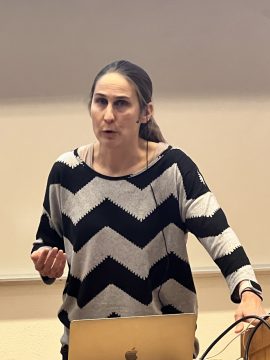RESEARCH ETHICS. Professor of Physiology Ingrid Wernstedt Asterholm has extensive experience of both formulating her own applications and, as a former member of the regional ethics committee, assessing other people’s applications. Here is her advice on applying for ethical approval for animal experiments.
During the seminar ‘Animal ethics – from the ancient Greeks to tips for success in animal ethics applications’, Ingrid Wernstedt Asterholm shared her experiences and advice on the ethical review of experiments using animals. The seminar was held on Thursday November 23, 2023 as part of the ‘Research Ethics – open faculty meeting’ series, and was organized by the Council for Research Ethics.
As the title suggests, Professor Wernstedt Asterholm began with an overview of the history behind the current legislation on animal experiments. However, she devoted most of the seminar to the application and the process leading to animal ethics approval.
Balancing up the benefits
Before applying for ethical approval to conduct animal experiments, researchers must have passed a course in laboratory animal sciences. In addition to obtaining ethical approval, the responsible researcher must also provide the animal facility staff with written instructions and risk analyses and is responsible for ensuring that an animal record is created for all experiments.
You should apply for ethical approval from the regional ethical committee on animal experiments, and one of the six regional committees in Sweden is located in Gothenburg. The committee has 14 members. Both the chair and the vice-chair are lawyers, while half of the 12 other members are researchers or laboratory animal staff, and the other half are lay people (including four politicians and two representatives from animal welfare bodies).

“The ethical committee on animal experiments must weigh up the potential benefits of the animal experiment against the potential discomfort involved,” explained Professor Wernstedt Asterholm during her presentation. “The wording of your application forms the basis for that assessment.”
The committee can only approve an application if it clearly states that the expected results cannot be achieved without animal experiments, that the number of animals to be used is as low as possible, and that the animals will not be subjected to any more discomfort than is absolutely necessary. The application must therefore clarify in concrete terms how the experiments comply with the 3Rs principle: Reduction, Refinement, and Replacement.
Meeting with the assessment panel
Before writing your application, it worth familiarizing yourself with the new application system, which is available on the Swedish Board of Agriculture’s website. You should also consult with veterinarians, and the manager of the animal facility will need to agree to you applying for an ethical permit for your experiment. The application must be in Swedish, and must be written in such a way that the lay members of the committee can understand the planned experiments.
Expect it to take at least three weeks (or longer) from submitting your application to receiving a decision. You should therefore begin your application in plenty of time before you plan to start your experiments. After submitting your application via the Swedish Board of Agriculture’s website, you will be invited to a preparatory meeting with the assessment panel, during which you will be asked questions about the experiments you plan to carry out. This meeting will usually take place in Swedish, but it may be possible to hold it in English if you give advance notice. If you cannot attend in person, you can ask a colleague to attend in your place.
The purpose of the preparatory meeting is to ensure that your application contains all the information needed to make a decision. The meeting serves as a useful form of support for your application to succeed. The chair of the preparatory meeting will subsequently present your application during the decision-making meeting. If you provide a good description of what you want to do in your experiments and why, this enables the chair to describe and answer questions about your application during the decision-making meeting.
After the meeting with the assessment panel, you will often need to modify your application. In the new system, it is not possible to make changes within the existing application, only to upload appendices. This is done after the preparatory meeting.
The committee does not approve animal experiments that cause severe suffering, where suffering is likely to be prolonged, and where suffering cannot be alleviated. If it is uncertain how the animals will be affected by an experiment, the committee may approve a study with a smaller number of animals, or may limit the study in other ways (pilot study).
The regional ethical review committee’s decision can be appealed to the Central Animal Ethics Committee.
Advice on writing your application:
- Familiarize yourself with the application system on the Swedish Board of Agriculture’s website.
- It is useful to read colleagues’ successful applications.
- Write your application as a Word document or similar. There is always a risk that the system will get stuck. Once your application is ready in a separate document on your computer, paste the sections of text into the correct places within the system.
- It is important that the application you submit is good from the start, as the new system does not allow any changes to be made after you have submitted your application (only addition of appendices).
- The focus should be on how the animal experiences the experiments, not on your research objectives.
- If you don’t think the animals will experience discomfort, state this clearly.
- Ensure that you state the correct injection volumes, the method of administration, the maximum number of administrations, the maximum volume of blood that will be drawn, etc.
- Use good Swedish. For non-native Swedish speakers, it is a good idea to get help from a colleague who speaks Swedish.
- Keep it as short as possible – no one wants to read overly long texts. Don’t go into too much detail about your project. Instead, focus on how your application takes the 3Rs principle into account.
- Don’t refer to appendices. However, a flowchart outlining what an individual animal will go through during the experiments may be a good idea.
- A layman should be able to understand your application. Keep it simple.
- Remember to include your contact details.
- Describe the end point of the experiment – the point at which your experiment is finished if everything goes to plan.
- Describe the termination point of the experiment – the point at which you stop the experiment for animal welfare reasons, regardless of whether or not you have reached the end point of the experiment. Describe the signs you look for in the animals, and how you ensure that these signs are detected. This is very important information for assessing your application.
- State the degree of severity of the planned procedure (‘terminal’, ‘light’, ‘moderate’, or ‘severe’). If the degree of severity is ‘severe’, a veterinarian must be involved in the supervision of the animals, and the experiments must be evaluated afterwards by the Central Ethics Committee.
- Describe how you ensure that you do not use more animals than necessary (Reduction). Explain how you came up with your needed animal number, and double-check your calculations to ensure they are correct.
- Describe how you reduce suffering (Refinement). Describe any alternative methods to refine the experiments that you cannot use in your experiments, and explain why you cannot use them.
- A meeting with a veterinarian takes place before the preparatory meeting. The veterinarian can give you up-to-date information about how to describe the animals’ living environment and the methods used for anesthesia, pain relief, and euthanasia.
- You need to specify the animal species to be used and motivate your choice s, describe where the animals come from, and whether they are genetically modified.
- Describe different experimental groups: Which animal species are included in the group and which experimental procedures will be performed, the maximum number of times the procedures be performed, how long the procedures will last, and how long the animals will be allowed to rest before a new procedure.
- A popular science summary needs to be uploaded via the European Commission’s ALURES e-service. Ensure that the number of animals and the degree of severity correspond with what you have stated in your application.
BY: ELIN LINDSTRÖM











